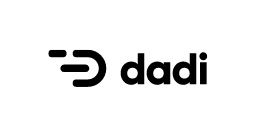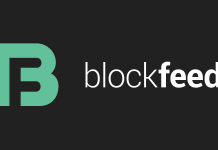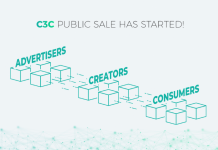- This is not financial advice.
- Do your own research before you invest in anything including this project
- This interview is not a suggestion or an endorsement of this ICO or any other ICO or any cryptocurrency.
- This interview has been organised and published for free.
- Investitin.com staff are investing in this ICO.
- The questions have been written by investitin.com and the answers have been provided by the project.
- Your capital as at extreme risk when investing in ICOs and cryptos.
- Please consult your local financial advisor to verify if this project is considered as a security before you invest.
- The links to dadi.cloud are affiliate links
Interview with Joseph Denne and I’m the founder and CEO of DADI
Can you introduce yourself and your role in DADI?
My name is Joseph Denne and I’m the founder and CEO of DADI. I conceived and developed the vision and initial architecture for our Web Services and the DADI network. I’m hands-on with development, setting our direction and pitching in on the day to day, as well as working on the operational side of the business.
My background is in technology. I’ve been a technical director for the majority of my career (starting in 1999 at the height of the dot-com boom), both in my own businesses and for large multinationals, such as the Publicis group. During this time my focus has been on content platforms, both in terms of infrastructure and individual digital products. Over the years we’ve worked with hundreds of brands, publishers and broadcasters. Our work has been widely recognised and I’ve been fortunate enough to win a bunch of awards (two Emmys, several Webbies, multiple Lovies, a Bafta, multiple Sony Academy awards and a Rose d’Or).
Anyway, enough about me!
What does DADI stand for?
DADI stands for Decentralised Architecture for a Democratic Internet. It’s a reflection of what the technology is and what we stand for as a business.
Is DADI a network within/on top of the Internet, what are the advantages of adding further layers to the Internet?
DADI is a network of web services on top of the Internet, so you can think of it as part of the fabric of the Web.
When we speak about democratising the Web, what we mean is that we are challenging the status quo that has allowed a handful of huge organisations to dominate the market in a virtual monopoly. We see this as our mission – acting to offer a real and democratic platform and working to uphold the principle of net neutrality in the process.
This is the key advantage of our network. And with it comes advantages for the individuals and businesses that use the technology. DADI is faster to develop with, cheaper to run and more performant than “transitional” cloud platforms such as AWS.
DADI is described as improving the publishing workflow, can you compare the traditional online publishing approach with the DADI approach?
Workflow for publishers is one component of the platform, provided by DADI Publish (https://dadi.tech/en/publish). We’ve spent many years working with content management platforms and in a previous business set up and ran Symphony CMS. So we know content and the publishing requirements around its various forms extremely well.
DADI Publish was developed hand in hand with editorial staff drawn from a wide number of publishers (including Bauer, Haymarket and Monocle). It is designed to get out of the way of the core task editors perform: writing. To this end it provides clean, fast and clearly structured interfaces that just make sense. So often traditional publishing platforms blend technical and editorial functionality, providing indecipherable interfaces in the process. WordPress is a great example of this. It’s a powerful and mature product, but unless you know it inside out, using it is a daunting task.
DADI’s web services also eschew the traditional approach of creating monolith systems: single apps that are all things to all men. Instead we have focused on creating discreet tools that can work together in myriad configurations. This allows for a level of simplicity that is simply not possible in legacy platforms, enabling a step change in speed in development, deployment and use.
What are the costs to host a website on the DADI network, are there initial costs and ongoing costs?
DADI is a pay per use platform. It’s Open Source and there are no licences or upfront costs. Running costs in the network are significantly cheaper than traditional hosting setups. For example, we saved Haymarket 65% on their monthly hosting bills from the point of go live on the platform. And on average we expect the network to be around 90% cheaper for the majority of use cases.
What is the current status of the DADI network?
We have a testnet live and operational for a key client. We will be releasing information about this in the coming weeks.
How many websites can it currently host?
Testnet capacity is a fraction of the live capacity of the network, but even so, the current deployment can handle hundreds of millions of requests in a given month.
What are the differences between hosting on DADI and traditional hosting providers?
We’re working to make DADI’s front end interfaces as simple as possible. Right now setting up and deploying to AWS or to Google Cloud requires a huge amount of knowledge. We are breaking down these barriers and providing user experiences that are streamlined and simple to use.
Individual web services within DADI are similarly streamlined and easy to develop on and deploy.
In most traditional hosting platform you are essentially buying a server or a set of servers (virtualized or dedicated). These are typically located in one place and as a result are limited in terms of performance because of the further away from the user from the physical location of the hosting, the slower the overall performance. In DADI you are paying for a series of interconnected VPCs, which massively localise your content through the use of distributed nodes numbers in the tens of thousands.
Can you tell us more about Stargates, Gateways and Hosts?
Stargates are the largest nodes in the network. They provide DNS services and orchestrate the network, creating ad-hoc VPCs to meet demand. They also run the smart contracts layer, operating the DAO and ensuring the payments flow from Consumers via the MPC contract.
Gateways are the entry point to the network for incoming requests. They maintain the job queue for Hosts and distribute tasks according to capacity.
Hosts run Consumer app bundles: individual deployments of DADI Web Services. They connect into Gateways, requesting and satisfying jobs as they become available.
What are the requirements and incentives to host these services?
There will be a proof of stake requirement for all service layers in the network, increasing in value based on the importance of the node type. Stargates require a large POS, Gateways less so and Hosts less again. Specific values will be announced in January/February.
Node operators are paid a percentage of all revenue in the network. The vast majority of revenue will go to nodes. This will be attributed proportionally based on both proof of availability and proof of work.
Do you envisage the possibility of third-party services to host these services on behalf of the token holders?
Yes, absolutely. And we’re working with a number of key partners in industry to facilitate this. More information on our partnerships will be released in the coming weeks and months.
What is the structure of the ICO?
We’re not running bonus programs as we really want to avoid any semblance of shilling. However, we do have a referral program that pays 5% of the total invested amount of those people that you refer. Referral IDs are provided in the profile pages of registered investors on https://dadi.cloud.
We’re running a Presale and a Public sale, with a discount, applied in the Presale. The contact address for the Presale will be released sequentially to registered users from the start of the sale and will have an individual investment cap.
What is the current valuation of the DADI project?
This is a big question and one that it is very hard to put a figure to. We’ve invested around $2m USD to date and are a profitable business, with an MRR of $200k. And the market we’re in is huge – $250b annually at last count, and growing extremely quickly. So to answer your question it really depends on your perspective. We’re raising a significant amount to fund the next phase of development and roll out, but firmly believe that the token value through the Public sale is discounted significantly vs. the value of the network overall. So take from that what you will.
What is the hard cap / soft cap?
Our soft cap is $1m (USD). This is the absolute minimum required for us to progress development on the network to the point of public MVP. We’ve raised this directly via existing partners, meaning that there’s no soft cap going into the Pre and Public sales. Our hard cap is $30.25 (USD), which reflects what we believe we need to be able to deliver on our ambition.
What are the requirements to participate in the ICO?
You need to register for the sales at dadi.cloud. There’s no minimum investment amount. Investment is in ETH.
What are the token prices and pre-ico and ico stages?
Our Presale starts at midday (UTC) on the 22nd of January. The token is priced at $0.4 USD during this round (a 20% discount on the Public sale).
The Public sale starts at midday (UTC) on the 29th of January. The token is priced at $0.5 USD during this round.
The Presale will have a cap on individual investment level. The cap level will be confirmed in early January.
What are your thoughts on the current stats of the crypto space?
It’s a fascinating time to be alive. We’re seeing the largest transfer of wealth since the oil rush and with it the rollout of technologies that will shape our world for generations. I describe us as being in hour one of this journey: the total cap of Bitcoin, for example, is significantly less than that of Microsoft. The blockchain is radically altering the nature of ownership, and properly applied can usher in a new era of capitalism – one that works for everyone.
For more information please visit dadi.cloud
We thank Joseph Denne for the interview.










